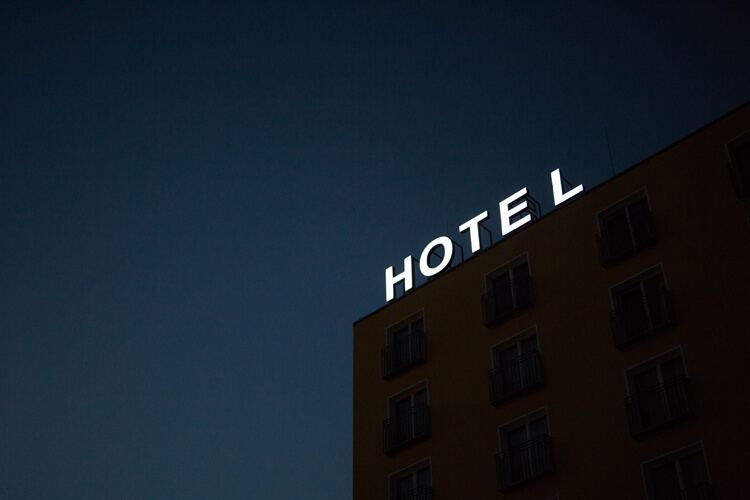It’s happening; the holiday you booked months ago – comprising of both travel and accommodation – has finally arrived. You’ve spent countless hours researching, booking, packing and envisaging a relaxing time-out from life itself. It stands to reason, therefore, that the last thing you’d like to find on entering your home-away-from-home is mold.
Yet, believe it or not, a mold problem in a hotel can be more common than you might think, for the following reasons:
- Fluctuating temperatures. Most hotels are fitted with hundreds of air conditioning units – a mold spore’s potential playground. The problem is further enhanced as guests tend to utilize these units for optimum internal temperature – as opposed to controlling humidity – which means condensation – and, therefore, mold – is very much a risk (more on this later!). Read more about controlling humidity here.
- You’d be hard-pressed to find a hotel room that is not adorned in wallpaper. And whilst it may look nice, it traps the condensation and stops the walls from breathing – both vital elements in controlling the temperature of the room. The glue holding the wallpaper in place hardly helps the situation, either, as it provides yet more nutrients for mold to thrive off.
- Another regular feature of a hotel, carpet – and its padding underneath – is highly susceptible to mold.
- Large water mains. Just as with any large building, a big water supply carries the risk of leaks, floods and general malfunctions – especially if excess moisture is let out the pipes – which are all catalysts for the presence of mold.
As a hotel
You’d like to hope that you do everything in your power to ensure your hotel is always mold-free . And there are many ways in which you can achieve this:
- Regularly cleaning the rooms – and bathrooms – should help keep mold at bay. That being said, however, this can also contribute to the problem, as simple housekeeping may cover up the true extent of a mold problem, lulling you into a false sense of security. You should ensure, therefore, that the cleaning is of the highest, most professional level at all times – even if you hire in a special company once a month on top of your regular housekeeping. Educating your staff on what to look for in terms of mold is also a must.
- Inspect the rooms. As well as cleaning, you should call in the experts regularly to check explicitly for mold.
- Turn off air conditioning when unoccupied. As well as consuming a large amount of unnecessary energy, this can encourage mold to grow, too – especially when combined with the hot air from outside during the summer months which will condense on surfaces inside the room. Think walls, picture frames, furniture and mattresses – all potentially affected. And because of high room occupancies during these months, this condensation has very little time to dry up. It may be prudent, therefore, to also encourage your guests to minimize the use of air conditioning – especially before they head out for the day. Read more about how to properly maintain your HVAC unit here.
- Insulate the partition walls. For a relatively small cost, you can eliminate the thermal bridges – and thus heat flow – between the walls to prevent condensation from forming. Definitely worth it in the long run!
- Empower your employees. Enable your staff with the flexibility to respond to situations as they see fit – no one likes a ‘computer says no’ attitude!
However, if a guest does complain that they have found mold in your premises, remember that customer service is key. Apologise, offer a refund and bend over backwards to find alternative, mold-free accommodation – even if that just means upgrading them to another room.
As a guest
Due to the temporary nature of your stay, you may accept things that you otherwise wouldn’t dream of. But if – among the other mix of hotel room smells that signify vacation – you find mold, report it immediately and ask to change rooms. Your health can be affected by breathing in mold and the sooner you notify the hotel, the sooner they can rectify it so that the next guest is not affected.
Happy holidays (yes, yes – we know the kids have only just gone back to school. We can dream can’t we?).


5 comments